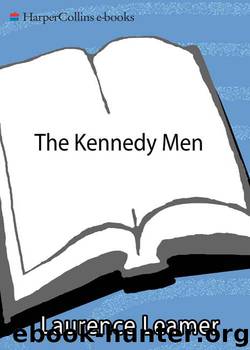The Kennedy Men by Laurence Leamer

Author:Laurence Leamer [Leamer, Laurence]
Language: eng
Format: epub
ISBN: 978-0-06-203988-0
Publisher: HarperCollins
Published: 2010-03-02T16:00:00+00:00
Jack knew that this would be a close election, but after listening to Vice President Richard Nixon give his acceptance speech on July 28 at the Stockyards Amphitheater in Chicago, he became even more aware of the challenge he faced. Jack realized, as a more narrowly partisan politician might not have, that Nixon’s speech was “a remarkable political demonstration.”
Like Jack, forty-seven-year-old Nixon was a veteran of World War II, a man of the new generation ready to assume power in the America of the 1960s. Both candidates were well versed in international affairs and strong anti-Communists who believed that the major challenge of the new administration would probably lie outside the nation’s borders.
“Our next president must tell the American people not what they want to hear but what they need to hear,” Nixon told the Republicans. Nixon, like Kennedy, realized that the political idiom of his day was full of half-truths, and half-truths were often worse than lies, for one could never parse the truth from the lie. “Why, for example, it may be just as essential to the national interest to build a dam in India as in California,” Nixon asserted, a message that many Americans did not want to hear. A politician who spoke such truths too loudly might not win election, but one who spoke them not at all did not deserve America’s highest office.
“Mr. Khrushchev says our grandchildren will live under communism. Let us say his grandchildren will live in freedom.” That was one of Jack’s themes, and he could have spoken that line and most of Nixon’s speech that day. The two politicians had nearly as many affinities as differences. Underestimated by many of their enemies, patronized by some of their friends, they both had the knowledge and the experience to lead America into a new era. It was the character of each man that had not been tested.
The wildly popular Eisenhower had overseen what most Americans considered a blessedly comfortable era of growing affluence and peace. That was the record that Nixon had the happy duty of defending. Jack had the more difficult task of not overtly criticizing the revered, grandfatherly Eisenhower while talking of a new troubled world full of what Time called “anxiety and discomfort.” For the most part, this was not only a posture shrewdly calculated to elect him president by playing on the natural anxieties of Americans in the age of the cold war; it was Jack’s own deeply felt judgment of what his nation faced in the decade ahead.
“I think that in the 1960s you’re going to have a terribly difficult time, whoever is president,” Jack told James McGregor Burns privately in 1959. “I think Eisenhower is probably going to get home relatively free…. So I would say in a sense it’s almost like Calvin Coolidge and Herbert Hoover. I would say that in 1961 or ‘62 all these matters—changes in weapon structure, changes in NATO, and all the rest—are going to come to a head. And I would
Download
This site does not store any files on its server. We only index and link to content provided by other sites. Please contact the content providers to delete copyright contents if any and email us, we'll remove relevant links or contents immediately.
| U.K. Prime Ministers | U.S. Presidents |
Waking Up in Heaven: A True Story of Brokenness, Heaven, and Life Again by McVea Crystal & Tresniowski Alex(37768)
Empire of the Sikhs by Patwant Singh(23059)
We're Going to Need More Wine by Gabrielle Union(19020)
Hans Sturm: A Soldier's Odyssey on the Eastern Front by Gordon Williamson(18555)
Leonardo da Vinci by Walter Isaacson(13292)
The Radium Girls by Kate Moore(12003)
Tools of Titans by Timothy Ferriss(8347)
Educated by Tara Westover(8035)
How to Be a Bawse: A Guide to Conquering Life by Lilly Singh(7458)
Permanent Record by Edward Snowden(5812)
The Last Black Unicorn by Tiffany Haddish(5617)
The Rise and Fall of Senator Joe McCarthy by James Cross Giblin(5259)
Promise Me, Dad by Joe Biden(5130)
The Wind in My Hair by Masih Alinejad(5070)
A Higher Loyalty: Truth, Lies, and Leadership by James Comey(4937)
The Crown by Robert Lacey(4791)
The Iron Duke by The Iron Duke(4337)
Joan of Arc by Mary Gordon(4080)
Stalin by Stephen Kotkin(3940)
